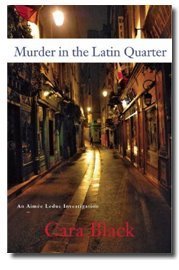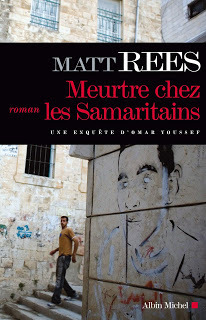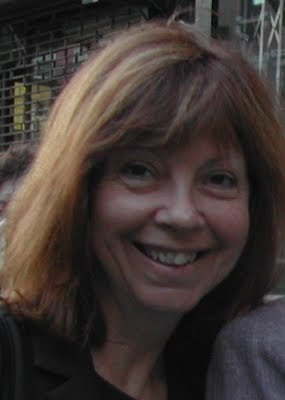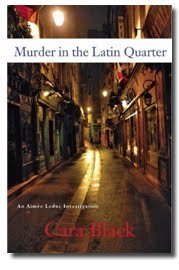Matt Rees's Blog - Posts Tagged "paris"
Review: Haitian scandal, voodoo and family obsession with Cara Black

Murder in the Latin Quarter
by Cara Black
Soho Crime, isbn 1569475415
Just when our detective is set to get down to some normal, profitable work, a woman walks into her office with a story that sets our mystery on a personal track. It’s a tested opening for a detective novel, but Cara Black’s version of it has an originality and freshness that works well. The detective is Aimée Leduc, a Parisian computer-security expert, and the mystery woman is an illegal Haitian immigrant who claims to be Leduc’s half-sister. On her first attempt to get more details from the supposed sister, Leduc discovers the murdered body of a Haitian scientist and realizes that the newcomer may be involved in something more than family genealogy.
The ninth episode in Black’s series of Paris detective novels takes Leduc through a plot involving voodoo, corrupt businessmen, and scandal in Haiti. But it remains rooted in the streets of Paris. Leduc ends up crawling through windows and tunnels, covered in the muck of the City of Light. It’s a good image for the way Black keeps the novels grounded there. Paris may be everyone’s idea of a romantic city, but to those who know it it’s also a place of “diversity”—a nice modern way of saying that there are many awful inequities. “Murder in the Latin Quarter” is a fine way to slap some reality onto those vacation memories and to get a picture of the varied life in the French capital.
As an episode in a lengthy series of novels, there are also intriguing developments in Leduc’s obsession with family--her radical mother abandoned her as a girl, and her policeman father was murdered, so it’s easy to see why she ponders the issue a lot. The possible blood connection to the Haitian woman drives Leduc through the dangers of the book, and by the end it’s clear that the same urge will be eating at her until the welcome arrival of the next novel by Cara Black.
French mystery trove
For those who happen to read some French, Planete Polar is a wonderful source of news and reviews about crime fiction, crime writers, and movie offshoots. It's written by Philippe Lemaire, cultural correspondent for Le Parisien. Philippe's a delightful fellow who's interviewed me a couple of times -- once in Paris, and also in Bethlehem when he came to write about my first crime novel The Collaborator of Bethlehem. One of my favorite recent posts on Planete Polar is his amusing assessment of a "slightly mad" book about the crime novels of Fred Vargas. His blog isn't restricted to French writers, of course ("Polar" is the French word for crime novels, and "Planete"...well, even a Parisian would admit that there's more to the planet than French novels) and Philippe has access to all the big writers from around the world visiting Paris for publication of their latest books. Take a look at Philippe's newest post, in which he decidedly gets under the skin of Douglas Kennedy....
Everything's better in Paris

It’s great to hear good news. It’s even better to hear it when you’ve just arrived in Paris. Everything sounds better when you hear it in Paris.
Last week I had a few days in the French capital courtesy of my publisher Albin Michel, which brought me over for the release of my third Palestinian crime novel “Meurtre chez les Samaritains” (English title: “The Samaritan’s Secret”).
On arrival my publicist, a delightful Marseillaise named Agnes Chalnot who works with the elegantly Parisienne Florence Godfernaux, informed me that the first of my Palestinian crime novels “Le Collaborateur de Bethleem” (“The Collaborator of Bethlehem” in the US; "The Bethlehem Murders" in the UK) had been shortlisted for the Prix des Livres de Poche. The winner will be announced in the autumn, but in the meantime it was a lovely way to start my visit.
Albin Michel usually puts me up in the Hotel Lennox, just around the corner from their offices in Montparnasse (that’s the 14th Arondissement, if the numbers make sense to you as they spiral out from the very center of Paris…). It’s a fabulous old artistic area. Norwegian-born photographer Ulf Andersen has lived in the neighborhood a long time and, as we walked about, he showed me the atelier where Picasso used to work, the café where Sartre (“He was very ugly,” Ulf remembers) used to have his morning coffee, and the art deco Hotel Aiglon where Bunuel used to stay when he visited Paris. Nowadays Montparnasse is a bit too pricey for artists, who tend to live in the area near the Bastille.
I enjoy returning each year to Paris when my books come out. Partially that’s because of the culture of books and intellectualism that’s specific to France. The head of Albin Michel who’s a great supporter of my books, Olivier Betourne, used to be the editor of Jacques Derrida, the great deconstructionist philosopher, and my editor Vaiju Naravane is a polymath Indian woman who’s able to tell hilarious tales of trekking to the furthest regions of southern India with Shiva Naipaul.
It’s also because I’ve come to know some of the journalists I meet quite well, particularly those like Philippe Lemaire of Le Parisien and Vladimir de Gmeline of Valeurs Actuelles who have been out to Jerusalem to tour the West Bank with me. This year Philippe remarked that I seemed more relaxed than when my last book came out. I was pleased to hear it, and I must credit my wife Devorah and my son Cai for calming me down!
Another friend I was glad to see during my quick visit was Francois Busnel. He’s one of the most important literary journalists in France and he has an approach to his work that’s vastly different from most of those who write about books. Francois came to Jerusalem to write about me a couple of years ago. He travels each month to interview writers around the world. This summer he’s spending a few weeks in Afghanistan with his friend Kabul-born Atiq Rahimi, who won the Prix Goncourt last year. Not your typical book reviewer, as you can see. If you read French, take a look at his articles in L’Express. They’re excellent.
With only a few hours left in Paris, I picked up a Quiche Lorraine and feuillete de Roquefort near the parliament. The quiche you probably know has chunks of ham. The feuillete is a rich, rich pastry packed with Roquefort, and frankly it was a little too intense for me. But as I sat in the Jardins du Luxembourg with my pastries, watching the French reading books (not playing with Blackberrys) beneath the massive bust of Paul Verlaine, I wished I could take a little of their ethos home with me.
11 arrondissements to go: Cara Black’s Writing Life

Each of Cara Black’s titles takes her computer-security PI Aimee Leduc on the trail of a murder in a different quartier of Paris -- Montmartre, Clichy, Bastille. Aren't those names alone enough to make you want to read them? The latest is Murder in the Latin Quarter, where Aimee tries to trace a Haitian woman who turns up in her office to tell her that she’s her sister. One of the pleasures of a long, developing series like Black’s is that we’ve come to know the detective and her family backstory – radical mother and police detective father – over the course of eight previous books, giving the appearance of a putative sister an extra sting beyond the impetus it gives to the plot of Murder in the Latin Quarter. In much the same way, we’re getting a gradual underground tour of the real Paris. As Cara points out, she has 11 arrondissements (districts) to go. I hope that at that point she won't quit: Paris has a lot of suburbs.
How long did it take you to get published? Three and a half years.
Would you recommend any books on writing? Bird by Bird by Anne Lamott. How to Write a Damn Good Novel by James N. Frey
What’s a typical writing day? Up early, coffee, feed the dog and hit the laptop for several hours. I take a break during the day then at four o'clock it's more coffee and back at the laptop. I re-read and revise the morning's work or often continue a scene working for as long as it takes.
Plug your latest book. What’s it about? Why’s it so great? Murder in the Latin Quarter takes place in September 1997 set against the aftermath of Princess Diana's death. A woman claiming to be Aimée's half sister disappears and in trying to find her Aimée discovers the body of a visiting Haitian professor at one of the Grands Ecole's surrounded by a ritual circle of salt. Her investigation leads to back door politics involving the World Bank, the IMF, human traffikers and personal insight into her own past. Murder in the Latin Quarter gave me a chance to explore and go deep into areas of the Left Bank I'd never known about before. The faded charm of the still intellectual center, the old Roman baths, the quarries under old Roman roads used and renamed today.

How much of what you do is: a) formula dictated by the genre within which you write? b) formula you developed yourself and stuck with? c) as close to complete originality as it’s possible to get each time? I'm not sure this is a strict answer but one of the reasons I love reading crime fiction stems from knowing that the framework, ie. an investigation, provides a map to follow in the story. The books I read use this framework in a different, fresh way and provide a resolution. Some form of justice is served. So that's what I aim for in my books, something we get so little of in real life. Since each of my nine books have Murder in the title, it's a bit of a given, that it's a murder investigation. Aimée works in computer security and it's a challenge for me to involve her with murder in each book and make it plausible. It helps that she's a licensed PI, has a background in criminal investigations previously, so she's got the skill set and background. She gave up criminal investigation after her father's death in a bombing during surveillance. In each book, she's on a journey - an inner one and solving the crime.
What’s your favorite sentence in all literature, and why? Well, one of my favorite beginning lines is: The camel died at noon. From The Key to Rebecca by Ken Follett. I mean after that one sentence how can you put that book down.
What’s the best descriptive image in all literature? Something Dostoyevski said about 'don't tell me the moon is shining, show me moon glinting on a piece of broken glass.'
Who’s the greatest stylist currently writing? Alan Furst Marguerite Duras when she was alive
Who’s the greatest plotter currently writing? Phillip Kerr knocks me out.
How much research is involved in each of your books? Tons. More than you want to know. But that's what I love about writing a book set in Paris. I need to know the weather, the politics, what's on sale in the newspaper that day, the street fashion, the music, the clubs, the new Vespa model, computer technology, what's in season at the market, everything for that time, that day in Paris in 1997. So it's semi-historical in a way given that it happened more than ten years ago. But then there's the older historical research I do in the archives of that quartier, this particular district of Paris; what happened here in the 1700's, which King built this, the origin of a street name, who built this Metro station, when did this sewer line connect, when did the quarries get sealed over, accounts of life here during the German Occupation, interviews with police, private detectives, the local café owner. It's endless because I'm always finding a piece of gold, - an overheard conversation, an old newspaper article, a 'nugget' at the last minute before I head to the airport that deepens the story, adds another layer or spins in a different plot direction or becomes the seed of the next book.
Where’d you get the idea for your main character? I knew I couldn't write as a French woman -- can't even tie my scarf properly -- but I'd met a female detective in Paris who ran her own agency. Through her I met several other female detectives of all ages who gave me unique insights. Let's face it, a detective in the traditional mold is a loner, an outsider to society and that's Aimée. In a way she's half-American, half-French neither fish nor fowl but being half-French gives her a unique fashion sense. She has elements of my friend, a Parisenne who wear heels even to the Commissariat after her apartment was burgled, the woman you see on the street rushing into a cafe, a contemporary woman living in a vibrant city layered by history. Paris has twenty arrondissements -- I've got eleven more to go.
What’s the strangest thing that happened to you on a book tour? I had a stalker. He attended several book signings in San Francisco where I live. He'd sit in the front row, close his eyes, then at the q+a ask detailed questions about Paris streets and before I could answer pull out his maps and answer the question himself. He'd follow me to the parking lot talking about Paris. Asking me where I stayed and foolishly I told him the street name one time. Lo and behold, he showed up in Paris at the Red Wheelbarrow bookstore in the Marais the night of my signing. He asked the bookstore owners how to reach me since he'd walked up and down the street and hadn't 'seen' me and acted so weird they almost cancelled the signing. He showed up later in the bookstore with his 80 year old mother, a bag of chocolates and no questions for once! We never could figure that out.



